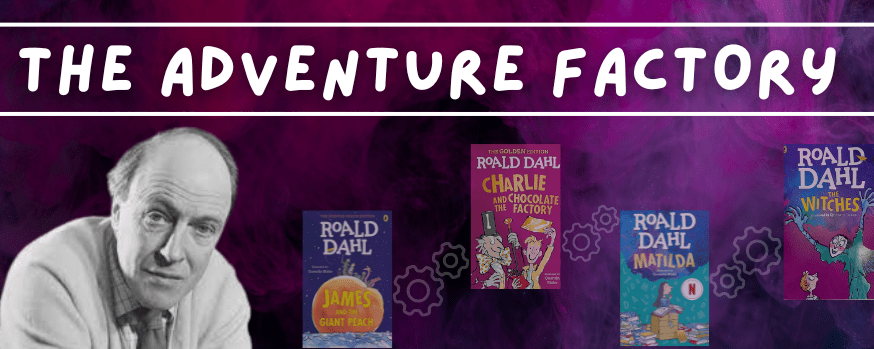
The chocolate factory. The witch. The peach.
Children’s author Roald Dahl was known for turning such simple objects like these into legendary books that are still read and movies that are still watched to this day. If you’ve turned any page of one of his books, you know all of his tales were tailor-made for big imaginations.
From books to blockbuster movies, Dahl was, and will likely always be, one of the most celebrated authors in history. But what most of us don’t know is how Dahl’s life was every bit as wondrous as the books he was known for.
Born the 13th of September, 1916, the British-born Dahl experienced much darkness in his early life. Dahl’s childhood influenced his often darkly-comedic moods that are sprinkled throughout his books.
When Roald when three-years-old, he lost his seven-year-old sister due to Appendicitis. Just weeks later, his father died of Pneumonia at the age of 57. His mother decided to keep the family in Wales instead of going back to Norway (as Roald’s parents were Norwegian immigrants), since her husband wanted the children to get their education in English schools. He considered them the world’s best.
(- story continues below)



Trouble in the Tour of Schools
Throughout Dahl’s life, he made his way through different schools. The first school he attended was the Cathedral School of Llandaff, where he had at the age of eight he got in trouble with the headmaster for placing a dead mouse in a jar of gobstoppers at a local sweet shop; it led him along with his four other friends to being caned for his actions.
The owner of the sweet shop, according to Dhal, was a “mean and loathsome” old woman who inspired his creation of the mean headmistress, Miss Trunchbull, in Matilda.
He soon transferred to St. Peter’s boarding school in Weston-super-mare, during which he missed his mother greatly and would write to her every week. Years later, after his mother’s death in 1967, he learned that she saved every one of his letters, and they were later broadcast as BBC’s Radio 4’s Book of the Week in 2016.
At the age of 13, Dahl attended Repton School in Derbyshire. At this school, he had to endure with what he described as “an environment of ritual cruelty and status domination.” He and other students had to endure harsh beatings from both older boys and school personnel.
“All through my school life I was appalled by the fact that masters and senior boys were allowed literally to wound other boys, and sometimes quite severely… I couldn’t get over it. I never have got over it.” — A quote from Dhal’s autobiography Tales of Childhood
His Crushing Tour of Duty
Something else many people don’t know about the British writer is that he joined the Royal Air Force (RAF) as an aircraft man during the Second World War in 1939. He eventually went on to advanced flying training in Iraq, and after six months of training, he became a pilot officer on the 24th of August, 1940.
That same year on September 19th, Dahl was sent to fly his Gloster Gladiator (A British biplane fighter used by the RAF) from an Egyptian Air Force base in Egypt to 80 Squadron’s forward airstrip (a United States Air Force squadron). In the final leg of the aircraft’s landing approach, the biplane was quickly running out of fuel as he struggled to find the airstrip. With night approaching, he had no other choice but to attempt a landing in the desert.
But the landing didn’t go as planned.
The gear struck a boulder, causing the aircraft to crash in the Libyan Desert, leaving Dhal in the middle of a flaming wreckage.
In the crash, Dahl ended up fracturing his skull and breaking his nose . He was even blinded temporarily for six weeks due to his brain swelling. Although harmed, he was able to get himself a few feet away from the aircraft’s remains before losing consciousness.
Although many would view this as a traumatic event, that along with his difficult childhood didn’t stop him from writing stories that filled the childhoods of millions. In fact, he believed that his brilliant creativity was a result of his head injury.
Tough Discipline & Rules of Writing
Roald had a very specific routine when it came to writing, claiming that, “writing is not inspiration, it’s keeping your bottom on the seat.”
Two hours, twice a day, for every day of the week, he’d be in his shed, lying back in his armchair and resting his feet up upon a trunk which was full of wood and tied to the chair with wires so it would not move from its place.
He would then take his writing board, which he himself made, placing it under a thick roll of paper to keep it at the angle of his preference. With six sharpened pencils and a cup of coffee, he was ready to start writing.
Roald Dahl had eight rules when it came to children’s books:
1. Just add chocolate
2. Adults can be scary
3. Bad things happen
4. Revenge is sweet
5. Keep a wicked sense of humor
6. Pick perfect pictures
7. Films are fun… but books are better!
8. Food is fun!
His books, although made for children, were always sprinkled with rule number five: A wicked sense of humor.
An example of this can be found in chapter 15 of James and The Giant Peach, when James’ cruel aunts, Aunt Sponge and Aunt Spiker, are killed by the peach. Dahl writes, “There was a crunch. And then there was silence. The peach rolled on. And behind it, Aunt Sponge and Aunt Spiker lay ironed out upon the grass as flat and thin and lifeless as a couple of paper dolls cut out of a picture book.”
Still The Classic Storyteller
Roald Dhal was and remains one of the most popular and successful children’s authors, being called one of the greatest story-tellers of the 20th Century. His books, read by millions (with a few even being made into films and musical adaptations), inspire us to allow our creativity to run free while letting us know that in every corner, magic can be found.
“And above all, watch with glittering eyes the whole world around you because the greatest secrets are always hidden in the most unlikely place. Those who don’t believe in magic will never find it.”
– Roald Dahl, The Minpins





